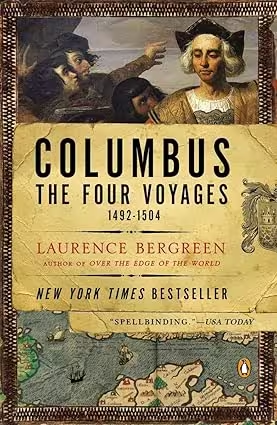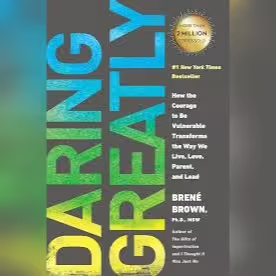This book review of Columbus: The Four Voyages by Laurence Bergreen is part of my US History Reading Quest.
This post pay contain affiliate links, which means that I may receive a commission if you make a purchase using these links. As an Amazon Associate I earn from qualifying purchases. Thanks for helping to support the content on this site.

Columbus: The Four Voyages
- Author: Laurence Bergreen
- Genre: Non-fiction, U.S. History
- Publisher: Penguin Books
- Pages: 423 pages, Paperback
Columbus was not the first to discover the New World, but he was the one who made it a lasting part of human consciousness.
Laurence Bergreen, Columbus: The Four Voyages
I just finished Columbus: The Four Voyages by Laurence Bergreen as part of the beginning of a new cycle in my US History Reading Quest. I’m always excited to kickoff new cycles, because I get to start another complete journey through US history. I also particularly enjoy pre-colonization time period and the era of ocean explorers. I haven’t made my way around to Columbus’s story yet, so it felt like the right place to begin. Anytime you are reading about someone with a reputation like Columbus, you’re always a little skeptical and not sure how to feel about approaching such a subject, who can be as controversial as celebrated. So, to say the least, I went into this with some mixed feelings.
Bergreen’s book is packed with details and tension, and it doesn’t shy away from the darker sides of Columbus’s character. There’s a lot to like about this book: it’s vivid, immersive, and at times felt to me like Bergreen was right beside me as he recounts each of the four voyages Columbus undertook. Bergreen does a great job balancing excitement with historical fact, leaving the reader to draw our own conclusions about Columbus. It’s an unfiltered look that adds depth to a figure we often see in a simplified way, for better or worse.
Historical Context
Bergreen sets his story in the late 15th century, a time when Europe was on the cusp of major changes in exploration, trade, and technology. Columbus’s journeys in 1492 and the years that followed were part of the wave of exploration, fueled by competition among European nations for wealth and power. Columbus sailed west under a Spanish flag, drawn by the lore of of riches and unknown lands beyond the horizon – and a faster trade route to Asia.
But, the voyage proved much more difficult. Indigenous populations that Columbus encountered were entirely unprepared for the arrival of Europeans, and Columbus’s “discovery” triggered consequences that shaped history for centuries. Bergreen dives into the clashing cultures, explaining the Europeans’ arrival as both a breakthrough in exploration and a disruption for the native people. Bergreen captures this complexity, presenting a time of ambition, greed, and remarkable courage.
My Review
A Fresh Perspective on Columbus’s Character
I was really impressed how Bergreen committed to revealing the “true” Columbus (or perhaps as close as we can know him). He comes across as brilliant, ambitious, but deeply flawed. Columbus had a vision and confidence that pushed him forward, but it’s impossible to ignore the blind spots and self-interest that led to his downfall. He’s not portrayed as the mythic hero we might have learned about in elementary school, nor is he entirely villainous. Bergreen uses Columbus’s own words and logs, making you feel like you’re hearing from the man himself. At one point, Columbus writes about his grand vision, saying he was “led by the hand of God.” But he also betrays an arrogance that’s hard to sympathize with.
Bergreen seems to respect Columbus’s achievements but doesn’t let him off the hook. He leaves enough room for readers to wrestle with their own feelings about Columbus, which I appreciated. I’m finding that it’s okay to admire Columbus’s bravery in sailing into the unknown while also acknowledging the damaging effects of his actions.
Detailed Descriptions of the Voyages
Bergreen describes in engaging detail each of Columbus’s four voyages (hence the title!), making sure the reader feels tension, danger, and exhaustion from each of the journeys. I really felt immersed in the period and the struggles, and at times the adventure. I could almost literally hear the creaking of the ships, feel the waves tossing them around, and sense the desperation on board as food supplies run low and disease takes over. Not to mention ship worms – yikes! Columbus and his crew faced enormous risks—from hurricanes to hostile encounters with indigenous people. Bergreen’s descriptions bring these challenges to life, sometimes in stomach-churning ways.
One thing that struck me was how unpredictable these voyages were. Bergreen shows how Columbus’s ships were not just exploring but also enduring an endless test of survival. The Third Voyage, especially, is a nightmare scenario, with mutinies and extreme conditions. You can feel the toll it takes on Columbus as a leader and a man. These sections are intense, making it clear that Columbus’s story isn’t simply about discovery—it’s about endurance.
The Indigenous People’s Perspective
Bergreen doesn’t ignore the indigenous perspective, and this is a part of the book I really valued. The impact of Columbus’s voyages on the native populations is devastatingly clear, and it’s painful to read. Bergreen describes the interactions between Columbus’s men and the native people with honesty and sensitivity. The natives welcomed Columbus and his men at first, often generously sharing food and shelter. But that welcome was soon exploited, leading to mistrust and outright conflict.
One powerful moment in the book describes the “exchange” between Columbus’s men and the natives, which was often one-sided and cruel. Bergreen writes that Columbus “saw potential servants and converts,” and this attitude foreshadows the exploitation that followed. These moments are presented without apology, letting readers see the cruelty involved. For anyone interested in a fair and nuanced look at this part of history, Bergreen doesn’t disappoint.
What Works Well
I like Bergreen’s narrative style – it feels clear and free of academic jargon for someone (like me) who is just looking for a survey of the topic without going too deep and getting bogged down with jargon. He keeps the story moving, balancing Columbus’s achievements with his missteps and shortcomings.
The book’s strength is in its details, too—Bergreen delves into Columbus’s relationships with the Spanish crown, his crew, and even his family. He makes Columbus’s motivations understandable, even when they’re hard to agree with. For example, when Columbus insists that he’s found a new route to Asia, even after he’s been proven wrong, you can see both his stubbornness and his desperation to fulfill his promises. Bergreen lets us see Columbus as both human and myth, flawed but driven.
What Could Be Better
While Bergreen does address the horrific exploitation of indigenous peoples during Columbus’s voyages, I was looking for more. I had hoped to find a little more dedicated discussion with depth about the short and longer term impacts on these populations and cultures, to round the book out more.
It’s hard to fully trust the content, as much of what we know comes from second-hand accounts. Bergreen acknowledges this, so it doesn’t seem inauthentic. However, it makes you think about the gaps in knowledge he faced. It also raises questions about how he chose to fill them in.
Parting Thoughts
I feel like Columbus: The Four Voyages by Laurence Bergreen is a decent and relatively complex look at Columbus, one of history’s most controversial explorers. I felt that the treatment was mostly balanced: it presents his ambition and achievements alongside the painful impact his journeys had on the native populations he encountered. For what I was looking for, something accurate but approachable to a beginner / amateur to the topic, I appreciated Bergreen’s use of storytelling to bring the period to life. It still encouraged me to form my own opinions about Columbus, which I appreciated.
I recommend this book to anyone interested in exploring the deeper, grittier side of Columbus, beyond the sanitized tales of our elementary school days. It’s an eye-opening read, one that challenges our understanding of Columbus and the era of exploration.
Other Books You Might Enjoy
About the Author
Laurence Bergreen is an American historian, biographer, and author known for his in-depth books about famous explorers. He was born in New York City and graduated from Harvard University. Bergreen has written acclaimed biographies of historical figures like Marco Polo, Ferdinand Magellan, and Christopher Columbus. His book Over the Edge of the World, about Magellan’s circumnavigation, became a bestseller and received multiple awards. Bergreen has also been a finalist for the Los Angeles Times Book Prize. Through his detailed research and storytelling, Bergreen brings history’s most daring adventurers to life for modern readers.
Reading Details
Start date: November 9, 2024
Finish date: November 11, 2024


